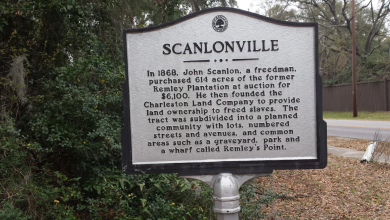RIDGELAND – The factory sits along a dusty unpaved road, on a stretch of land dominated by turf and trees, a few miles outside the center of this small town.
Up close, the plant’s four silver silos and a rusty chimney stand out, along with the smell of sawdust. The wood pellets it produces are often shipped to foreign countries and are seen as an important part of the economic activity for this long-distressed region, roughly 70 miles southwest of Charleston.
But this largely obscure plant is now also the source of negative attention after the Charleston-based Coastal Conservation League threatened to sue Jasper Pellets, its operator, for allegedly violating federal law.
In a letter last month, the organization and two other environmental groups accused the company of illegally operating its wood pellet mill for over a year and a half without having applied for or obtaining a proper operating permit. It alleges the plant, like other wood pellet facilities, is the source of harmful air pollution.
The groups gave Jasper Pellets 60 days to act before possibly filing a lawsuit, which could lead to civil penalties and a temporary shutdown of the plant.
Jackie Reynolds lives near the mill and would be happy if it closed. She attributed recurring turpentine smells, burning sensations in her trachea and sinus headaches to the plant.
“That mill’s insidious,” Reynolds said.
A man who identified himself as the owner of the facility declined to comment to a reporter. The environmental groups, in their letter, listed Charles Knight as the owner and CEO of the plant. When asked, the man would not confirm that was him.
The environmental groups said that wood pellet facilities emit hundreds of tons of harmful pollutants each year, and without a federal operating permit, the extent of Jasper Pellets’ emissions aren’t fully known.
“Pollution permits are required for a reason, and that is to make sure a facility like Jasper Pellets is following the same rules as other companies and industries, so those living nearby have a full and fair picture of what is coming out of the smokestacks,” Heather Hillaker, an attorney for the Southern Environmental Law Center, said in a statement. The organization is representing the Coastal Conservation League in the matter.
Residents’ concerns
Residents who live near the mill share the concerns about air pollution raised by the groups. Ruth Pepin said she sometimes smells a sharp odor, like a strong chemical, when driving along a road that runs within a mile of the facility while on her way home from work.
“If we have to smell it and we have to hear it, at least we shouldn’t have to worry about our health,” she said.
Reynolds and her neighbor Shannon Smith said vehicle traffic going to and from the factory also wakes them up in the middle of the night.
“I’m sleep-deprived,” Smith said.
Other nearby residents were more concerned with impacts from vehicle traffic than threats from pollution.
Don Pressley lives at the corner of a two-lane highway and the gravel route that runs by the plant and a neighboring turf farm. He hasn’t noticed any air pollution, but he has put up a sign that reads “SLOW DOWN” in red letters. He hopes that gets the attention of those driving tractor-trailers and other vehicles that sometimes speed along the dirt-and-gravel road.
Other residents, who live close to the plant but declined to give their names, said they have not smelled or seen distinct air pollution. But they said they notice a humming noise coming from the direction of the plant that is often louder at night.
A growing industry
Wood pellet producers are expanding throughout the Southeast, particularly Enviva, which says it is the world’s largest. The company has plants in Greenwood and five other states, including North Carolina and Georgia. Thunderbolt Biomass, another producer, has a plant in Allendale.
The pellets are used as an alternative to coal and demand is largely from Europe, where climate change policy requires greater renewable sources. The environmental benefits of wood pellets aren’t conclusive. Burning wood was thought to be carbon neutral as long as new trees replaced the ones lost. But more recent science has highlighted the importance of protecting forests and creating new ones to control planet-warming gases.
The Jasper County pellet mill’s operations drew the attention of the state Department of Health and Environmental Control last November related to another permit.
After an unannounced inspection, the agency determined Jasper Pellets built new equipment to expand the facility before receiving approval for the job, records show. The agency ordered the plant to stop operating until it issued a permit, which DHEC did in April, agency spokeswoman Laura Renwick said in an emailed statement. She declined to make a DHEC official available for an interview.
Health agency officials scheduled a meeting with Jasper Pellets representatives for next week about alleged violations related to the new construction, records show.
“DHEC will consider all available information in evaluating Jasper Pellets’ current and future compliance with applicable Clean Air Act and state requirements” in determining if further enforcement action against the facility is needed, Renwick said.
Local officials view the pellet plant as a way to help broaden economic activity for the region. Ridgeland is the seat of Jasper County and home to roughly 4,000 people. The town’s median household income is just under $29,000, a little over half of the state’s median, according to estimates from the U.S. Census Bureau.
The Ridgeland pellet mill was built and operated by different owners before shutting down in 2016, according to the environmental groups. In 2018, a company that became Jasper Pellets announced it would invest more than $8 million to restart and expand the mill. Doing so was projected to create 27 jobs over five years, the state Department of Commerce said at the time.
“We’re always excited to see companies investing in our state and specifically in our rural areas, such as Jasper County,” state Secretary of Commerce Bobby Hitt said at the time about the investment.
Jasper County administrator Andrew Fulghum said the plant is an example of an industrial project that officials hope will bring in varied tax revenue and require few services. He also pointed to two solar farms in Ridgeland.
Local officials have long awaited a proposed multibillion dollar Jasper port along the Savannah River that they hoped could open by 2025. But the timeline for the project, to be co-developed by the ports authorities in South Carolina and Georgia, has been pushed back to at least 2035.
Dennis Averkin, Ridgeland’s town administrator, declined to discuss the allegations against the pellet mill, but he spoke hopefully of the region’s prospects.
He said the region could get an economic boost from other upcoming developments: the construction of a new Interstate 95 interchange in nearby Hardeeville and an agriculture project in neighboring Hampton County.
“We’re optimistic there will be spillover,” he said.
Driving through Ridgeland’s downtown, on West Main Street, requires going through two traffic lights and over a railroad crossing. On a recent afternoon, cars lined the two-lane road, but only a handful of people walked past the barbershop, bakery, furniture store and other businesses along the main drag.
A popular spot was the Taqueria Rocio restaurant, where a small group sat outside, serenaded by mariachi music, the aroma of tortilla chips in the air.
Back at the plant, the smell of wood filled the air as pellets whooshed from one of the silos into the back of a storage container hauled by a tractor-trailer. When the flow stopped and the dust cleared, the truck lurched forward, its driver preparing the vehicle, and the pellets, for their next destination.





Leave a Reply
You must be logged in to post a comment.